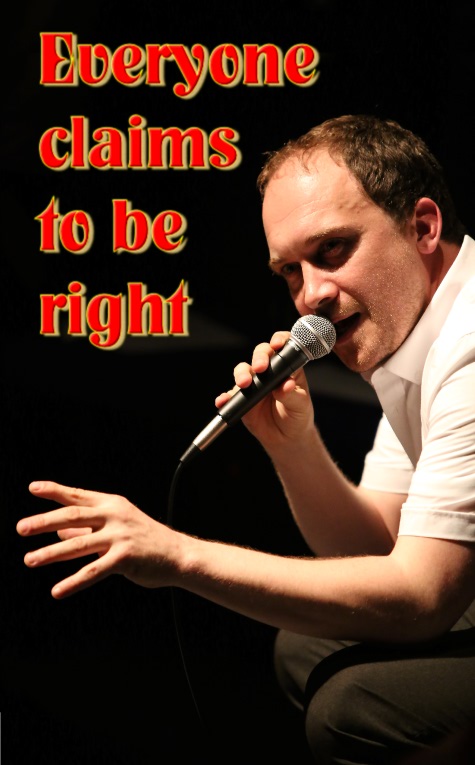|
 Confirmation Confirmation
Birmingham Rep Door
*****
‘EVERYBODY
thinks they’re right.’ This bold statement from writer and performer
Chris Thorpe is the basis for his performance,
Confirmation.
It is a show like no other; passionate,
innovative and purely based on the thoughts and beliefs of others.
Through the facts and opinions that Thorpe has
gathered, he creates a piece highlighting extremism and his own personal
response to the division of individual thoughts.
The performance feels like a dramatised lecture
for the most part. Thorpe is extremely knowledgeable and every line
uttered is laced with a wealth of information. He has a need to
understand the views of people, or groups of people, who hold political
and social views which are the polar opposite to his own. In his
energetic and rhythmic show, we see his journey of how he came to know
to know Glen, an extremist.
Within
Confirmation,
Thorpe works alongside Rachel Chavkin with whom he developed the show
and she is also the director. Together they create a challenging and
wonderfully thought-provoking piece that display to the audience what
happens when a conversation is had between two people with contrasting
political views.
The space is intimate and tightly atmospheric.
Thorpe bares all of his thoughts, feelings and research and makes sure
that no piece of information is left unsaid. In the explosive
performance Thorpe takes command for a complete hour and a half, we are
handed a mirror to see the reflection of the effects of the manipulation
of the mind, thus understanding Confirmation Bias.
Thorpe talks to us as himself for most of the
production, presenting to us in a poetic manner his extensive and indeed
impressive research into Confirmation Bias. His personal accounts and
findings give a unique personal quality to a project heavily reliant on
research.
Chavkin’s inspired direction sets out the
differentiation between the two opposing views referred to by Thorpe.
When Thorpe plays himself, he makes sure that he
keeps an informal approach and talks to us as if we were in perhaps a
seminar or lecture. He also takes on the role of Glen, a real person
with a different name. Thorpe has a fantastic skill of characterisation
and so we understand instantly when he switches from part to part.
As Thorpe clearly and interestingly explains in
the performance, confirmation bias is when we automatically look for
evidence that confirms our own preconceived notions. Thorpe does not shy
away from the fact that this was the stance he took when talking to
political extremists, looking for reasons and glimpses of evidence to
support that they are ‘bad people’.
What makes Thorpe’s and Chavkin’s project so
entirely gripping is that Thorpe goes on a journey. Together they have
made a story and have not just presented their findings from
conversations with extremists. Thorpe captures the audience, constantly
making us just as part of the process as he is performing. We sit around
the studio in a round formation, allowing Thorpe to be in the centre of
the small, totally engaged onlookers. There is a fantastic sequence
where we read out Thorpe’s questions to Glen and Thorpe answers back,
staring at nobody other than the person who dared to ask the question.
This is a wonderfully fashioned piece of research
that has built a bridge between science and art, proving that the
theatre is a place for everyone and everybody’s thoughts and views.
It is a piece that carries us with a passionate
mastery for words with its poetic and punchy script. To see Thorpe at
work is a good enough reason to go alone.
With a passion for his findings and a complete
need to tell audiences what he now understands brings out a rawness and
depth to admire within his performance. He has a particular talent for
maintaining a hold on the audience throughout the entirety of the
performance and his ways of characterising what he has seen through his
own eyes is truly innovative. To 05-12-15
Elizbeth Halpin
01-12-15
|

